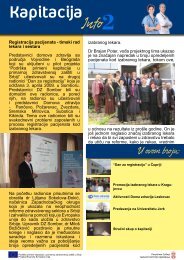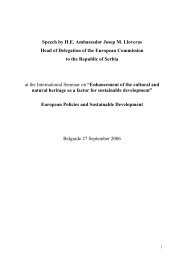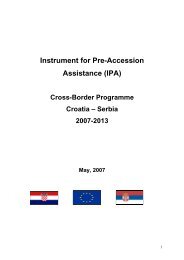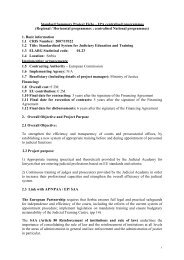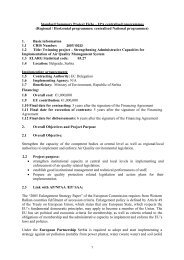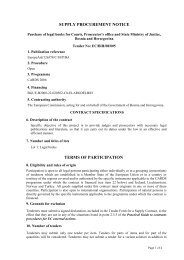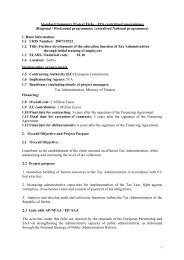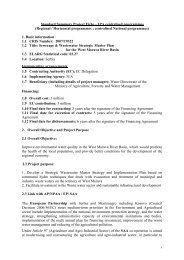Implementation of Common Aviation Area - European Commission
Implementation of Common Aviation Area - European Commission
Implementation of Common Aviation Area - European Commission
You also want an ePaper? Increase the reach of your titles
YUMPU automatically turns print PDFs into web optimized ePapers that Google loves.
3. Description <strong>of</strong> project<br />
3.1 Background and justification:<br />
On the basis <strong>of</strong> the National Strategy <strong>of</strong> the Republic <strong>of</strong> Serbia for EU Accession, Serbia<br />
signed the ECAA Agreement on 29 June 2006. By signing this Agreement, Serbia committed<br />
itself to the rapid implementation <strong>of</strong> EC aviation acquis for the purpose <strong>of</strong> ensuring high and<br />
uniformly applied safety and security standards, consumer rights rules, competition and state<br />
aid rules. The Agreement extents the Single <strong>European</strong> Sky to South-East <strong>European</strong> Region<br />
and facilitates the strengthening <strong>of</strong> economic and cultural links within Europe. This project is<br />
designed to provide assistance to achieve this overall objective.<br />
Civil <strong>Aviation</strong> Directorate <strong>of</strong> the Republic <strong>of</strong> Serbia (CAD), as a competent civil aviation<br />
authority in the Republic <strong>of</strong> Serbia, a successor to Civil <strong>Aviation</strong> Directorate <strong>of</strong> Serbia and<br />
Montenegro, founded in 2004. It performs its duties as a joint regulatory and oversight body<br />
on the basis <strong>of</strong> national and international regulations and by-laws, ratified international<br />
agreements, international standards and recommended practices with the crucial priority <strong>of</strong><br />
providing conditions for safe, secure and efficient air transport operations, observing market<br />
demands, principles <strong>of</strong> non-discrimination and transparency. It is worth noting that this kind<br />
<strong>of</strong> organization was approved and supported by all international auditors, since it enabled<br />
CAD to both retain and employ well educated and experienced staff.<br />
Since its establishment in 2004, CAD:<br />
- successfully completed the procedure for becoming the EUROCONTROL and JAA full<br />
member; concluded the negotiations for signing <strong>of</strong> the ECAA Agreement; undertook great<br />
efforts concerning the implementation <strong>of</strong> the ECAA Agreement; developed a Draft version <strong>of</strong><br />
Civil <strong>Aviation</strong> Law; provided advanced and recurrent trainings <strong>of</strong> the staff; actively<br />
participated in the work <strong>of</strong> all relevant international civil aviation organizations (ICAO,<br />
ECAC, EUROCONTROL, JAA).<br />
One <strong>of</strong> CAD’s main objectives in the future is full implementation <strong>of</strong> the ECAA Agreement<br />
with the view <strong>of</strong> enabling integration <strong>of</strong> the Serbian civil aviation into the Single <strong>European</strong><br />
Sky.<br />
Since implementation <strong>of</strong> the ECAA Agreement implies gradual transition to EU legal and<br />
operational practices, some <strong>of</strong> which were not previously applied in our country, and given<br />
the fact that civil aviation is a constantly changing area, adequate training <strong>of</strong> CAD’s staff and<br />
assistance <strong>of</strong> EU experts in development and implementation <strong>of</strong> new practices will<br />
significantly contribute to easier transition. This project should provide necessary assistance.<br />
Under CARDS the Republic <strong>of</strong> Serbia successfully cooperated with EU and benefited from its<br />
support to reform and modernization <strong>of</strong> the civil aviation sector. This assistance was mainly<br />
obtained through CARDS regional support in the area <strong>of</strong> air transport safety and air traffic<br />
management (ASATC Project), which is to be finalized by mid-2007.<br />
DG TREN organized two assessment visits to Serbia with the aims <strong>of</strong> monitoring the progress<br />
in the implementation <strong>of</strong> the aviation acquis (2005/6). On the basis <strong>of</strong> the Report on the<br />
ECAA Assessment (see Annex), conducted in October 2006 more technical assistance was<br />
recommended. The monitoring action also identified significant progress in preparations for<br />
accession to the ECAA was made in the safety area. The draft <strong>of</strong> a new aviation law<br />
3



